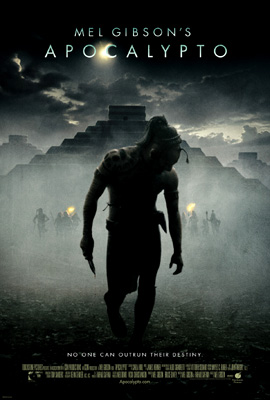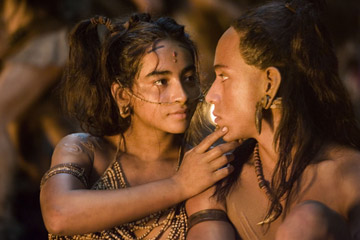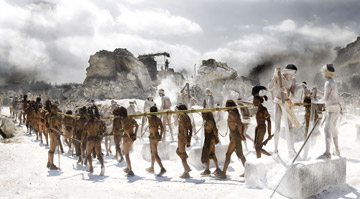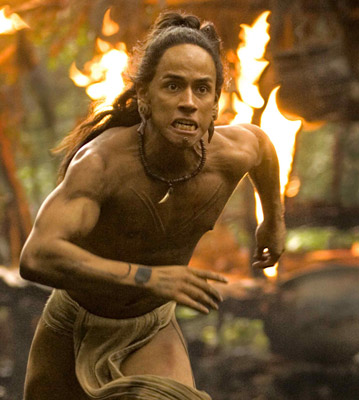Apocalypto

 Set during the final days of the Mayan culture, the film focuses on a man named Jaguar Paw (Rudy Youngblood). He lives a simple life in a remote jungle village, and is only trying to create a peaceful existence for his pregnant wife and young son. Early one morning, his village is attacked by a bloodthirsty Mayan army who slaughter most of the villagers, capture the rest, and plan to take the survivors back to their city to either sell as slaves or offer as a sacrifice to their god. Jaguar Paw is captured by the invaders, but not before he is able to ensure the safety of his family by having them hide in a deep hole during the attack. In the city of his captors, he is able to escape his fate of death and flees into the jungle, his captors close behind him in pursuit. His only desire is to outsmart his enemies, and find a way back to the waiting family that he left behind.
Set during the final days of the Mayan culture, the film focuses on a man named Jaguar Paw (Rudy Youngblood). He lives a simple life in a remote jungle village, and is only trying to create a peaceful existence for his pregnant wife and young son. Early one morning, his village is attacked by a bloodthirsty Mayan army who slaughter most of the villagers, capture the rest, and plan to take the survivors back to their city to either sell as slaves or offer as a sacrifice to their god. Jaguar Paw is captured by the invaders, but not before he is able to ensure the safety of his family by having them hide in a deep hole during the attack. In the city of his captors, he is able to escape his fate of death and flees into the jungle, his captors close behind him in pursuit. His only desire is to outsmart his enemies, and find a way back to the waiting family that he left behind. It's certainly a testament to Mel Gibson's popularity that he was able to convince the Disney-owned Touchstone Pictures to greenlight a multi-million dollar movie that features absolutely no big name stars whatsoever, and where the entire dialogue is spoken in a different language with English subtitles. Sure, he did the same thing with Passion of the Christ, but that was an independent film. This is a big studio release movie, and it certainly shows just what kind of power the guy has. As a filmmaker, Gibson certainly shows what he can do with Apocalypto. The movie is expertly filmed, and contains many sequences of beauty, terror, and sheer emotional power just with his images alone. He is able to use his settings to establish just the right mood, everything from the peaceful beauty of the jungle, right down to the smoldering ruins of past villages that the bloodthirsty army had attacked in the past. The movie certainly does not flinch away from the gore, either. However, Gibson is smarter than just using gore as a way to shock or horrify. The violence is necessary in telling the story, and although it can sometimes be overwhelming (such as a lengthy sequence where a group of men have their hearts ripped out, then their heads cut off), it can also be powerful and sad. A good example of this is a scene shortly after Jaguar Paw escapes from his captors, and stumbles upon a giant pit filled with headless corpses, all past villagers who were dragged from their homes in order to be sacrificed, just as his people were. Gibson wisely does not linger on the carnage, he simply lets us see the true darkness of the moment, and then moves on. It is a brief yet powerful moment that would have lost its effect had it lingered longer.
It's certainly a testament to Mel Gibson's popularity that he was able to convince the Disney-owned Touchstone Pictures to greenlight a multi-million dollar movie that features absolutely no big name stars whatsoever, and where the entire dialogue is spoken in a different language with English subtitles. Sure, he did the same thing with Passion of the Christ, but that was an independent film. This is a big studio release movie, and it certainly shows just what kind of power the guy has. As a filmmaker, Gibson certainly shows what he can do with Apocalypto. The movie is expertly filmed, and contains many sequences of beauty, terror, and sheer emotional power just with his images alone. He is able to use his settings to establish just the right mood, everything from the peaceful beauty of the jungle, right down to the smoldering ruins of past villages that the bloodthirsty army had attacked in the past. The movie certainly does not flinch away from the gore, either. However, Gibson is smarter than just using gore as a way to shock or horrify. The violence is necessary in telling the story, and although it can sometimes be overwhelming (such as a lengthy sequence where a group of men have their hearts ripped out, then their heads cut off), it can also be powerful and sad. A good example of this is a scene shortly after Jaguar Paw escapes from his captors, and stumbles upon a giant pit filled with headless corpses, all past villagers who were dragged from their homes in order to be sacrificed, just as his people were. Gibson wisely does not linger on the carnage, he simply lets us see the true darkness of the moment, and then moves on. It is a brief yet powerful moment that would have lost its effect had it lingered longer. While I praise Gibson's vision, it is the story that accompanies the visuals that I find less than thrilling. The film is at its best during the opening moments, depicting the life of Jaguar Paw's village. Even during the attack on his village, I was still completely enthralled, fascinated in where the story was going to be taking me. My fascination quickly subsided when I began to realize that even the screenplay itself doesn't seem to know. The movie spends far too long depicting the journey to the Mayan city, where not much happens. When the movie arrived at the city, my interest picked up once again, and stayed up during the entire time as we witnessed the cruelty that the villagers are subjected to, and how the people of the city are manipulated into believing that their cruel actions are right and meant to appease their god. Then, as soon as Jaguar Paw escapes, the movie once again meanders for the entire rest of its running time. The movie becomes a non-stop chase as Jaguar Paw is pursued by his captors, and he slowly kills them one by one, luring them into traps or simply outsmarting them. It is during this point that Apocalypto really started to annoy me, because it turns into a brainless video game of a movie that is all action and almost no dialogue whatsoever. The villains are boring, because we learn absolutely nothing about them, so we feel nothing when they meet whatever grisly fate they happen to meet. The entire chase strangely never connects. We know that Jaguar Paw is trying to get back to the family that he left behind, but we find very little reason to care, because the movie never truly digs deep enough. The fact that the chase goes on for a good 40 to 50 minutes non stop doesn't help matters, and veers dangerously close to becoming overkill. For a movie to start out so strongly and sure of itself in depicting an old way of life, it certainly cops out when it turns into an imitation of an empty action movie.
While I praise Gibson's vision, it is the story that accompanies the visuals that I find less than thrilling. The film is at its best during the opening moments, depicting the life of Jaguar Paw's village. Even during the attack on his village, I was still completely enthralled, fascinated in where the story was going to be taking me. My fascination quickly subsided when I began to realize that even the screenplay itself doesn't seem to know. The movie spends far too long depicting the journey to the Mayan city, where not much happens. When the movie arrived at the city, my interest picked up once again, and stayed up during the entire time as we witnessed the cruelty that the villagers are subjected to, and how the people of the city are manipulated into believing that their cruel actions are right and meant to appease their god. Then, as soon as Jaguar Paw escapes, the movie once again meanders for the entire rest of its running time. The movie becomes a non-stop chase as Jaguar Paw is pursued by his captors, and he slowly kills them one by one, luring them into traps or simply outsmarting them. It is during this point that Apocalypto really started to annoy me, because it turns into a brainless video game of a movie that is all action and almost no dialogue whatsoever. The villains are boring, because we learn absolutely nothing about them, so we feel nothing when they meet whatever grisly fate they happen to meet. The entire chase strangely never connects. We know that Jaguar Paw is trying to get back to the family that he left behind, but we find very little reason to care, because the movie never truly digs deep enough. The fact that the chase goes on for a good 40 to 50 minutes non stop doesn't help matters, and veers dangerously close to becoming overkill. For a movie to start out so strongly and sure of itself in depicting an old way of life, it certainly cops out when it turns into an imitation of an empty action movie.
That really is the problem at the core of Apocalypto. For all of its well-developed scenes and beautifully shot landscapes, there is absolutely nothing underneath. We can clearly see the effort put into each and every aspect of the filmmaking process, but I have a feeling that the screenplay did not get quite as much attention. We don't feel connected to Jaguar Paw's plight, nor do we feel a connection to most of the characters. Every now and then, the movie will cut away from its main story, and show Jaguar Paw's wife and son that he left behind as they struggle to escape from the hole they used to hide. Even then, we never quite feel like they're in danger until the film's final moments when it starts raining, and they are in danger of drowning. In the end, Apocalypto is a textbook example of style over substance. I certainly don't regret seeing the movie, but it's failure to click emotionally is very troubling to me.
See the movie times in your area or buy the DVD at Amazon.com!






2 Comments:
You apparently missed the blatant Pro-Life message. The Hero is a man racing & fighting to save his family & 'unborn' child. While the villains are a society hell-bent on human sacrifice. The comparison to a modern culture which offers up the unborn to sacrifice to the idols of selfishness & conveinience to a toll of 30 million+ dead. This was the message beneath the surface of Apocalypto that you seemed to miss, and explains why you didn't care. Because the movie's message should get a reaction out of pro-lifers & pro-abortionists alike. After such movies as Braveheart, The Passion, & now Apocalypto, a movie goer should assume that a Mel Gibson movie will contain some kind of Judeo-Christian moral to the story.
By Matthew, at 4:40 PM
Matthew, at 4:40 PM
thats a good point. would the movie been as successful plot wise had the element of the "unborn" child been removed? personally i was gripped by the story line. i think there definitely is a certain draw to the element of the 'Unborn" child being born and the family continuing, but i feel gibson was moreso trying to capture the element of family continuing in general. had the unborn child not been in the picture, the audience would still have been captived in worrying about the lives of the mother and son. perhaps not as emotionally as there being an unborn born child, but none the less emotionally.
as for the writer of the original blog, i feel you definitely described the plot well. thats pretty much what happens in the movie. however i do feel gibson was most definitely speaking out on variety of isses regarding culture, western expansion, colonization, and also insight in many ways as to a dual idea of a utopia and distopia coexisting amongst one another, with out even the slightest notion of knowing the others existence. by your analysis of the movie i feel that you didnt take any of these things into consideration while you were watching this movie. lol by the way i just realized how comical it is that im writing to you about a movie that took place 4 years ago:)
By chaka, at 4:06 AM
chaka, at 4:06 AM
Post a Comment
<< Home